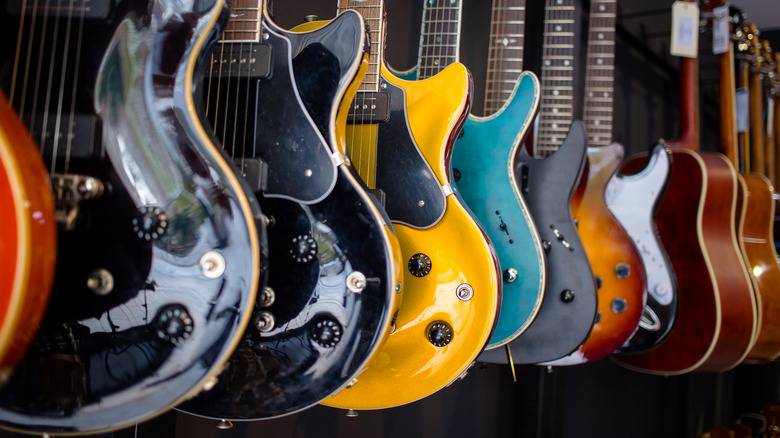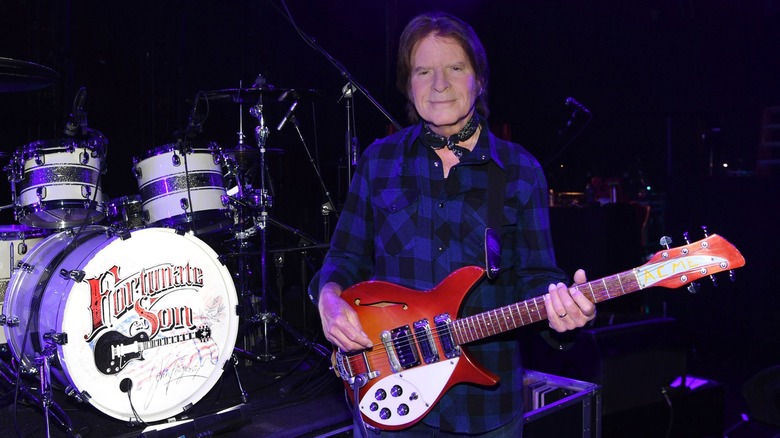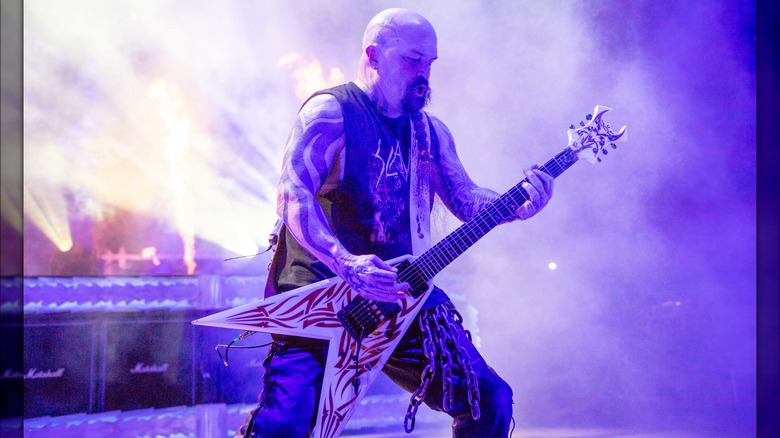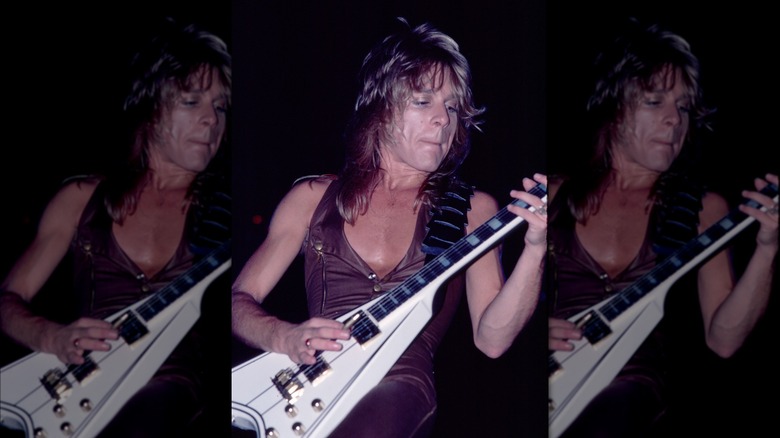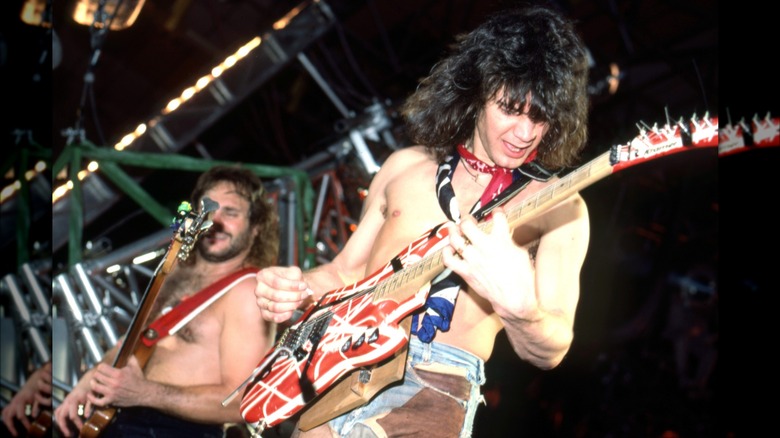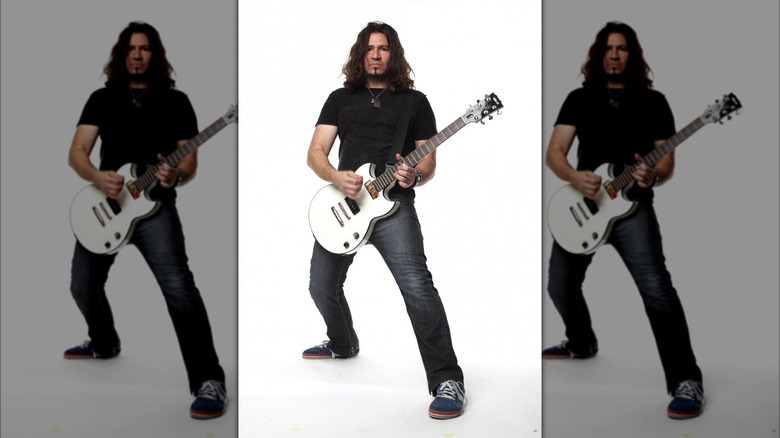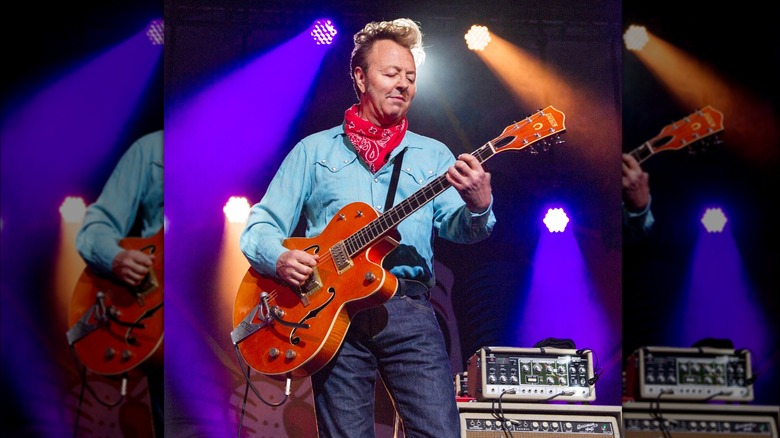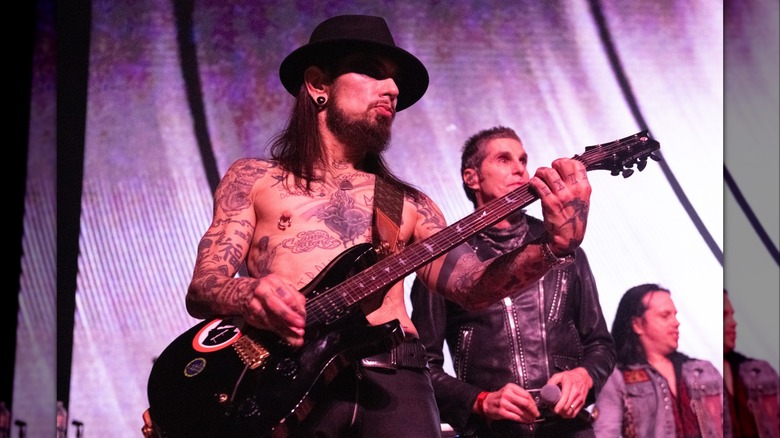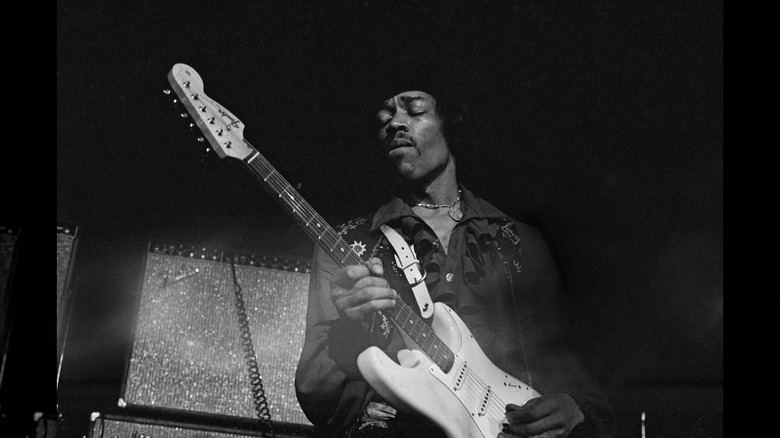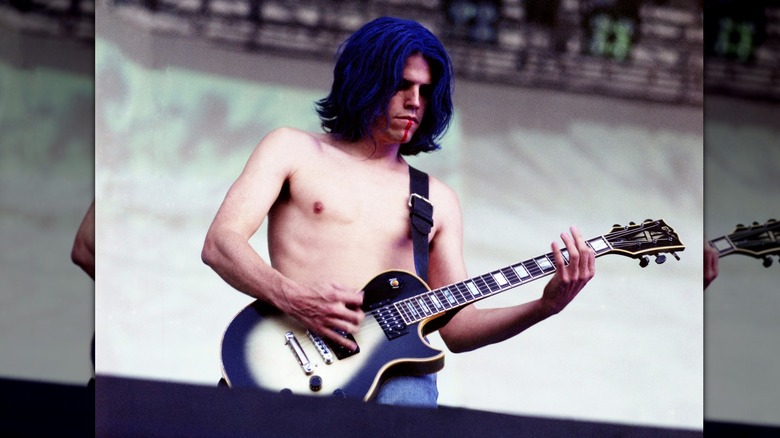Every Major Electric Guitar Brand Ranked
You don't have to play the electric guitar to love it. No other instrument is as wildly popular in the modern age and its sound has defined popular music for as many as three generations now, although the instrument has been around a bit longer.
The origins of the electric guitar spring forth from the 1930s as electricity rapidly spread to all parts of the country and people found increasing ways to put it to good use. Amplification became very popular with musicians in the '20s, followed by experiments with direct amplification of guitars. It was in 1937 that the first patent awarded for an electric guitar design was granted to G.D. Beauchamp, who would go on to be a co-founder of Rickenbacker.
Elvis Presley exploded the popularity of rock 'n roll music and with it, the electric guitar. With an increasing number of companies building electric guitars, competition has become fierce and has not let up since. Today, there are hundreds of guitar makers worldwide producing everything from cheap and flimsy models to exquisitely hand-crafted bespoke instruments for wealthy and famous professional musicians. While custom guitars are highly personal products made to custom specifications, there are many mass-produced guitars of varying quality, so here are the top 10 makers of electric guitars beginning with the very good ones and ending with the absolute best.
10. Rickenbacker
Electricity made it possible to make guitars from solid pieces of wood, which also created a unique tone. However, that did not mean they had to be solid, and Rickenbacker, one of the earliest guitar manufacturers, proved this to be the case. Rickenbacker models are all built with a style and in shapes that are unique and won't be found among the catalogs of any other manufacturer. The sound is rich and warm but with a specific tone most commonly associated with rock bands of the '60s. After all, the most famous of all Rickenbacker players is none other than George Harrison.
Both hollow-body and solid-body Rickenbackers are offered, and the price of entry is steeper than most, with an average guitar going for well over $1,000. Those who buy them know what they want and get exactly that. They are American-made and can be heard in a diverse range of music from the likes of Tom Petty, Radiohead, and Motorhead. While these guitars are of high quality and produce a nice sound, their exclusivity and niche sound rank them below other brands.
9. B.C. Rich
Most famous for its Warlock model, B.C. Rich guitars have always been cut in the most outlandish designs. Looking more like medieval weapons than instruments, the B.C. Rich has found popularity particularly among metal guitarists. This is probably due to the guitar's thick and loud tone that tends to work well with lots of distortion. Its relatively thin neck also makes it ideal for fast playing, although the irregular shape can take some getting used to.
Prices of B.C. Rich guitars are quite high. Some entry-level guitars can be picked up for around $300, but expect the most popular models seen with touring musicians to be closer to $1,500. The bottom line is that it's a great axe for playing metal that is loud and uses lots of distortion. That is why you will find them in the music of Slayer, Megadeth, and Wasp. Still, its market is fairly narrow, which makes it a less desirable brand overall.
8. Jackson
Jackson guitars came about as a split from Charvel and first gained notoriety when Ozzy Osbourne guitarist Randy Rhoads had a custom-built guitar made for him. It was an asymmetric flying V design he called Concorde and can be seen in much of the photography of the band before his death. Jackson has since continued to build great-sounding guitars, capitalizing on the association with hard rock and heavy metal to build its customer base.
With most Jackson models, you will find dual humbucker pickups –- two coils that work against each other to cancel out unwanted noise from magnetic interference -– Floyd Rose tremolo, and high-quality electronics. They are great for heavy distortion and can produce a big screeching sound when driven just right. Although they are played by some of the biggest names in rock, Jackson offers relatively affordable entry-level models too. You can expect to find some in the $300 range while others will be a couple of thousand.
The list of bands with Jackson players is long, including Anthrax, Iron Maiden, Machine Head, Death Angel, and many more. While they make a good sound, being exclusively for metal seriously limits their potential in the big picture.
7. Kramer
Few guitar companies have received a publicity boost in the way that Kramer did. In the late '70s, it was a fledgling guitar maker without much of a business. However, a chance encounter with management for the growing rock legend Van Halen brought its lead guitarist, Eddie Van Halen, together with Kramer to build a custom guitar. The resulting instrument soon became as recognizable a symbol for the band as any one of its songs. The haphazard red, white, and black shapes and stripes adorning the guitar are now iconic, and they helped Kramer become one of the most powerful names in music of the '80s.
Their guitars became known for being loud and crunchy, with the kind of hard-driving sounds ideally suited for hard rock. Being slightly less powerful than the overdriven metal guitars, the Kramers found homes in bands such as Bon Jovi, Judas Priest, and Mötley Crüe. Quality was excellent for many years, but the company fell on hard times and was eventually bought out by Gibson –- a common tale in the industry.
Kramer has since begun reissuing the guitars that made it famous, although they are now built in Indonesia. Quality is still decent, but they may not be what they once were.
6. Ibanez
Japanese guitar builder Ibanez started by making copies of American Gibsons and Fenders for domestic consumption. Someone began importing them after some time, and the good quality and value they represented soon found many fans among popular American musicians, and the brand has grown ever since. Today, Ibanez is one of the most respected manufacturers of guitars, and are played by a wide range of musicians and can be found at nearly any price point.
Like many other brands, Ibanez found its following among the shredders playing rock and metal in the '80s. Their playability and quick movement made them the choice guitar for virtuoso guitarists like Steve Vai. Furthermore, with the help of Vai himself, Ibanez created several special edition instruments, giving the musicians free rein to control the design.
This has kept Ibanez guitars relevant and popular throughout the decades, garnering itself a reputation for offering excellent quality at a reasonable price.
5. Yamaha
As one of the largest corporations in the world, Yamaha can often be a bit misunderstood. It is rare for a company known for making great motorcycles to also be known for equally brilliant instruments, but that is the enigma that is Yamaha. As such a large manufacturer with a vast array of products from pianos to saxophones, you might think the guitars are just mass-produced generic fodder. Yet, they are not, and some of the biggest names in music play a Yamaha.
What Yamaha excels at is offering value for money. You can get them for as little as $200 or spend as much as $2,000 and get a good instrument either way. The other thing you get with Yamaha is consistency, knowing that the one you bought in 1995 will be identical in play and feel to the same model made in 2015.
Yamaha may not have the same brand exclusivity and brand cachet as some of the others, but they have been good enough for the likes of Eagles Of Death Metal, Joy Division, and Bob Marley. Yamaha makes the grade for just being an all-around excellent purchase.
4. Gretsch
You are not going to find a Gretsch guitar on stage with a broad swathe of popular bands, but you will find them in the hands of some of the most talented guitarists on Earth. Gretsch began by making drums in the 1880s and expanded into guitar production when its first model was released in 1928. Since then, the Gretsch name has been synonymous with high-quality and unique guitars with a sound as unique as their style.
The most popular models from Gretsch are its hollow bodies. These guitars are large and ornate but have a unique tone with a crisp and clear sound. They are also available as semi-hollow bodies and solid body, but it is the hollow models for which it is best known. This gives them the kind of sound — when connected to a good tube amp — preferred by many players of country, rockabilly, and songs from the golden age of rock 'n roll. Thick bluesy riffs and clean harmonics come out clean and loud with a Gretsch, which is why you won't find them in many songs of heavier genres, which does somewhat limit their desirability and mass appeal.
The price further limits the market, as most low-end Gretsch models sell for around $500 and the upper end of its mass-produced models can easily exceed $3,000. Brian Setzer, Chet Atkins, Brian Jones, and George Harrison are all known for their Gretsch guitars.
3. PRS
Many of the well-known guitar brands we have today began in the '70s as independent luthiers started to build and sell guitars as troubles plagued major manufacturers of the era. Coming in at the tail end of this period was Paul Reed Smith, whose first factory for mass production opened in 1985. Since then the PRS name has earned a stellar reputation among some of the biggest names in popular music.
From the start, PRS differentiated itself by building guitars of the highest caliber. One of its early innovations was to begin pickup production in-house, allowing it to have full control over the manufacturing process and, ultimately, full control over quality. Another factor that sets them apart is the wood used in building them. In its factories can be found a wood library housing the options chosen for making the different parts of each guitar. Mahogany, rosewood, and ash are popular choices, but PRS also offers custom building to give players exactly the guitar they want.
PRS guitars are known as a professional choice and are played by plenty of big names. Guitar-driven music is often made with a PRS in the hands of such players as John Mayer, Dave Navarro, and John McLaughlin.
2. Fender
In the ranking of guitars, two names top the list, and both of them really ought to be set as equals for different reasons. One of them is the legendary guitar maker Fender. As one of the trailblazers of making guitars for the early days of rock 'n roll, Fender has reached legendary status many times over. Its Telecaster is one of its popular early models, but the Stratocaster is the real icon.
Designed originally by company founder Leo Fender, the Stratocaster, aka Strat, is often seen as perfection. This one first came out in 1954 featuring a trio of single-coil pickups in a new solid body design with the two iconic cutouts that allow for play in the upper register of the fretboard. The design not only allowed for a full and rich tone, but it was also easy to mass produce and maintain. Its instant popularity led to dozens of popular players adopting the Strat and countless companies later making copies of it, something that persists to this day.
The Fender Stratocaster is the defining sound of scores of hits across the ages. It is the principal sound of Pink Floyd, Led Zeppelin, Jimi Hendrix, and Stevie Ray Vaughan. Furthermore, Fender's other guitars have continued to find favor among the legends, such as Nirvana and Kurt Cobain's custom Jag-Stang and the Rolling Stones, with Keith Richards jamming on a Telecaster. It is hard to understate Fender's influence on modern music, particularly in the rock 'n roll genre.
1. Gibson
The other legend of guitar manufacturing is Gibson. The company had been making guitars since the late 1800s and jumped into electrifying them in the 1930s, with the EH-150 released as its first in 1936. That guitar was a hollow body in the Spanish style with a single pickup and violin-style sound holes.
Les Paul was an extraordinary performer in the post-war era with a huge following. He offered a new design to Gibson, which was rejected, but later helped to guide the development of the guitar that would bear his name. This solid body guitar featuring dual humbucker pickups was shaped in a style that mimicked Spanish guitars but with a cutout for playing up high on the neck. The resulting design made for a striking guitar that was comfortable to play and with high-quality manufacturing courtesy of Gibson. The mahogany and maple construction gives it a tone optimized for tones across the spectrum and provides exceptionally long sustain.
The Gibson Les Paul is favored by musicians of all stripes. Its deep and powerful sound can be heard in hard and driving music of bands such as Tool and Guns 'n Roses, but it also works well for more blues-based sounds from ZZ Top and Neil Young. Tool's unique sound comes from a Les Paul plugged into a Marshall amp with tons of overdrive, a common setup. Gibson is also famous for a range of other excellent guitars, notably the solid body SG, which is the signature of AC/DC guitarist Angus Young.
